Top 5 Integrate.io Alternatives to Check 2026
Summarize this article with:
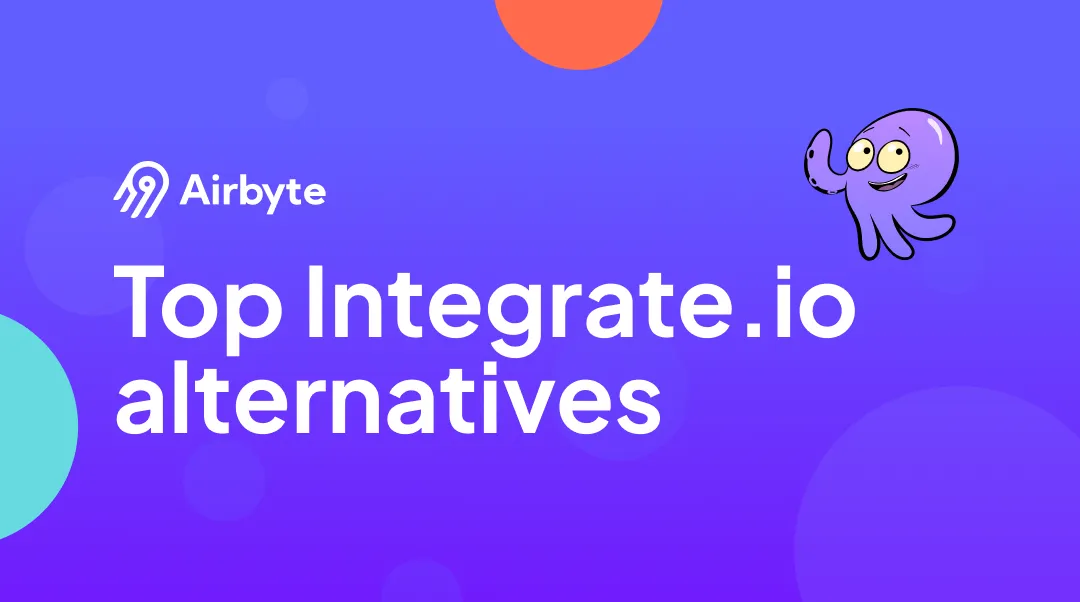
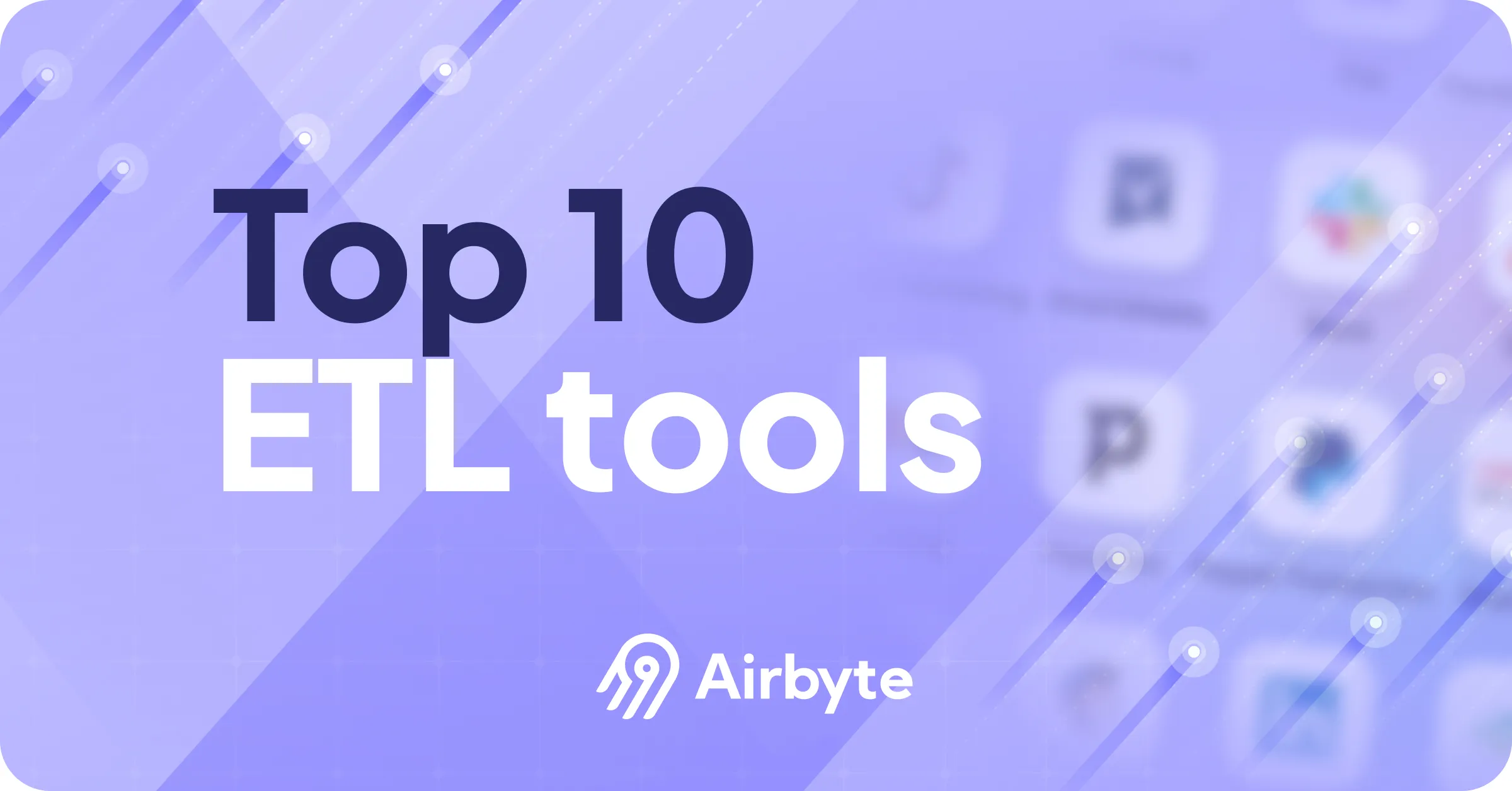
Efficient data integration is the foundation of a successful business as it helps unlock valuable insights, discover patterns, and perform robust data analytics. A number of platforms like Integrate.io have been developed to cater to your integration needs. However, in this growing corporate landscape, the presence of one tool is not enough. Having an understanding of different platforms that offer multiple functionalities is highly preferable.
This article will give you an overview of the Integrate.io platform, detailing its key features. You will also review the top five Integrate.io alternatives in 2025.
Integrate.io Overview
Integrate.io is a cloud-based platform that allows you to integrate, prepare, and process data for analytics. It supports different integration approaches like ETL and Reverse ETL to efficiently transfer data from one system to another. To facilitate data integration and establish instant connections with popular data sources, the platform is equipped with more than 150 pre-built connectors.
Some of the primary features of Integrate.io include:
- Since Integrate.io can run on both private and public clouds, it offers flexibility in deployment options. This allows you to choose environments that best suit your needs.
- It is equipped with CDC capabilities, which quickly capture changes made in your source file and replicate them into the target system. You can easily keep track of the changes made to your datasets and ensure data reliability.
- Integrate.io adheres to industry standards to safeguard your data. It offers SSL/TLS encryption, firewall-based access control, field-level encryption, and SOC 2 compliance.
Top 5 Integrate.io Alternatives
Let's look at the top five integrate.io alternatives you can use for data integration.
Airbyte
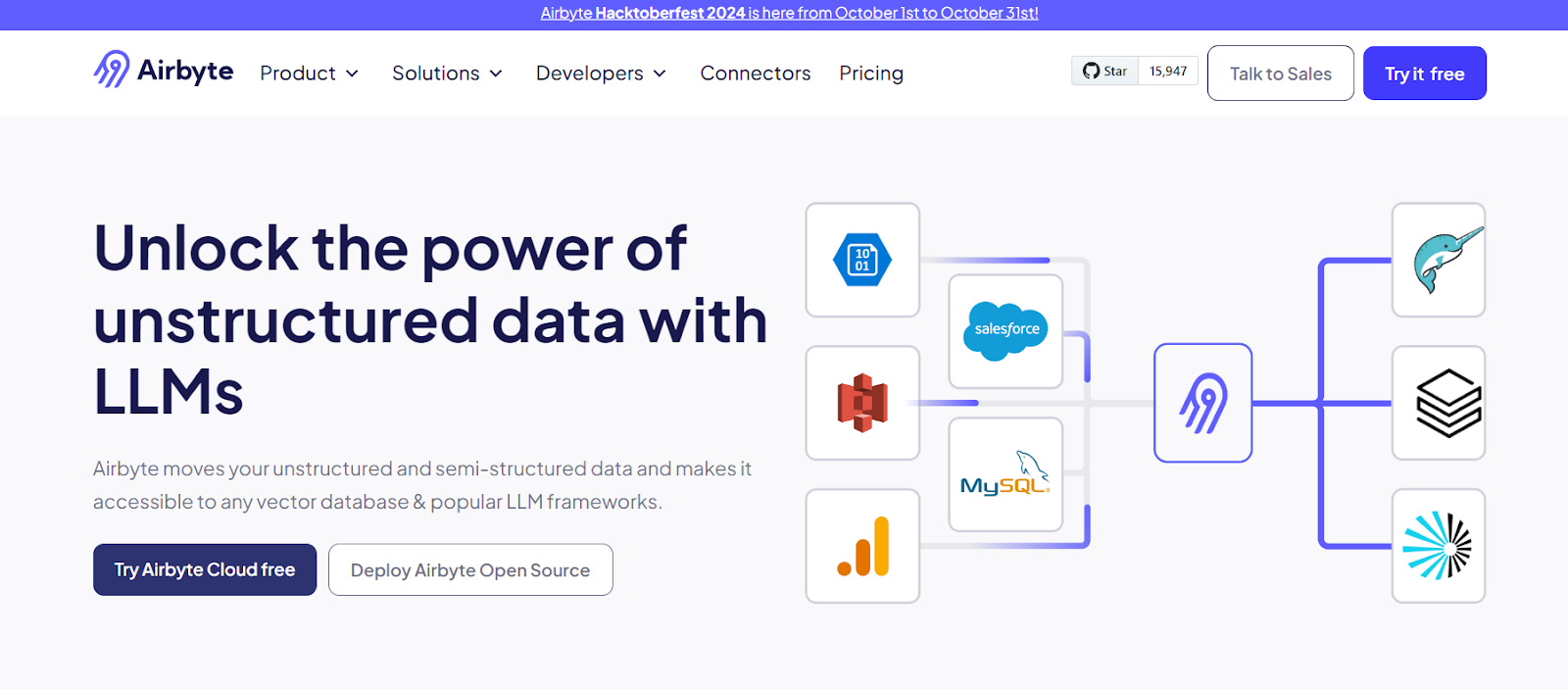
Used by over 40,000 engineers, Airbyte is a popular AI-powered data integration platform that simplifies the process of connecting data sources to target systems. It uses the ELT approach to integrate data from databases, applications, and APIs into data lakes, warehouses, and other repositories.
Some of the unique features of Airbyte are:
- Vector Database Support: Airbyte helps you load semi-structured and unstructured data directly into popular vector store destinations, such as Pinecone, Weaviate, Milvus, and Qdrant. This enables you to store and query high-dimensional vector data, which is crucial for powering AI applications.
- CDC: Airbte also supports the Change Data Capture (CDC) feature, which allows you to identify and capture changes made in the source file to replicate in the destination dataset. This process helps you quickly track changes made to your dataset and manage your data efficiently.
- Data Protection: Regarding data security, Airbyte keeps your data safe by encrypting it when it's migrating from source to destination. It has strong security measures, such as audit logging, access controls, encryption, and authentication mechanisms to ensure data integrity and protection. Airbyte also complies with industry-specific regulations like HIPAA, ISO 27001, GDPR, and SOC 2.
- Proactive Monitoring: With Airbyte, you can leverage several options to monitor your data pipelines. One of the options includes integration with Datadog, which enables you to analyze and monitor your data pipelines within Datadog's dashboards without incurring extra costs.
Pricing
Airbyte offers a transparent and scalable pricing plan in four versions—Airbyte Open Source, Airbyte Cloud, Airbyte Team, and Airbyte Self-Managed Enterprise. The open-source version is accessible to everyone and is ideal for handling small data volumes. The Airbyte Cloud version is a pay-as-you-go model that enables you to use Airbyte’s infrastructure without the hassle of managing servers. The enterprise edition is ideal for large-scale data workloads.
Advantages of Airbyte over Integrate.io
- Broad Connector Ecosystem: Compared to Integrate.io, Airbyte offers double the number of connectors. With its wide variety of more than 400+ pre-built connectors, you can enhance your data pipeline tasks. This includes data sources and destinations to integrate your data from diverse sources. Additionally, you can request the Airbyte team to provide a new connector to fulfill your integration needs.
- GenAI Workflows: Airbyte facilitates integration with AI-powered data warehouses, empowering GenAI workflows. With native vector support from platforms like Snowflake Cortex and BigQuery’s Vertex AI, Airbyte helps you move and store data efficiently to drive AI applications. The Snowflake Cortex destination lets you directly store vector data in Snowflake, optimizing performance for AI workloads.
- RAG Transformations: With Airbyte, you can utilize LLM frameworks like LlamaIndex or LangChain to perform complex RAG transformations, such as chunking and indexing. This enables you to enhance the accuracy of LLM outcomes.
- Sync Reliability: Airbyte’s record change history feature improves sync reliability by tracking record modifications during transfers. If a record is oversized or invalid and causes a sync failure, Airbyte modifies it in transit, logs the changes, and ensures successful sync completion.
- Custom Connectors: One of the main features that sets Airbyte apart from Integrate.io is its customizability of connectors. Airbyte allows you to build no-code/low-code custom connectors using the Connector Development Kit within minutes.
- Data Pipeline Management: Airbyte is a clear preference over Integrate.io when it comes to managing data pipelines, as it provides three ways to handle them—UI, Terraform provider, API, and PyAirbyte. The UI option allows you to build data pipelines without any programming skills. However, if you want to control your data operations programmatically, then API and Terraform Provider would be suitable options. PyAirbyte is an open-source library recommended for Python developers to build custom data pipelines.
- Multiple Deployment Options: Airbyte provides flexible deployment options, including self-hosted, cloud, and hybrid environments. This ensures that you can select the method that best fits your operational needs while maintaining compliance and control over your data.
- Open-Source Community: Being an open-source platform, Airbyte has a vibrant community of data practitioners (900+ contributors) and developers.
Skyvia

Launched in 2014, Skyvia is an integration platform that supports ETL, ELT, and Reverse ETL approaches to transfer data from source to your preferred destination. Due to these capabilities, Skyvia can manage complex operations like data splitting, conversions, and lookups, making the integration process seamless. Along with integration capabilities, Skyvia allows you to replicate incremental changes from your source file into the target system, thus ensuring data consistency across all systems.
Some of the unique features of Skyvia include:
- Skyvia possesses robust backup and restore functionality for cloud applications to keep your datasets safe. It enables you to perform scheduled or manual backups so your data is not lost during replication.
- With Skyvia, you get an extensive collection of 160+ pre-built connectors for streamlining integration across your desired platforms. However, if you cannot find your preferred connector, you can request a new data connector on Skyvia to automate your workflows.
- You can create a synchronization package in Skyvia that allows you to perform bi-directional data synchronization between cloud applications and relational databases. Skyvia also enables you to synchronize data with different structures, preserves all data relations, and provides powerful mapping settings for configuring the entire operation.
Pricing
Based on your business needs and the data you utilize, Skyvia offers multiple pricing plans—Free, Basic, Standard, and Professional. The Free plan is used for basic integration of small data volumes and can be used by everyone. The Basic version offers the ELT tool to integrate data based on the number of records per month. The Standard plan is recommended if you want access to ETL and ELT approaches. However, the Professional plan would be suitable if you aim to build robust and scalable data pipelines for any scenario.
Informatica

Informatica is a data integration and management platform tailored to migrate your data efficiently. You can quickly extract your data from diverse sources, transform it according to your enterprise needs, and load it into a data warehouse. This allows you to organize and manage your datasets and analyze metadata from its different repositories.
Some of the unique features of Informatica are:
- With Informatica, you can leverage several data transformation functions such as aggregation, filtering, masking, and many more. Moreover, it allows you to process your data in real time and batch to ensure timely data processing for diverse business needs.
- Informatica possesses artificial intelligence features like CLAIRE AI, which you can use to automate your data management tasks. This reduces the complexity of managing large datasets and saves time.
- It also enhances the data quality of datasets using profiling features. You can assess your data structure and quality, along with spotting anomalies, if any.
Pricing
Informatica offers a consumption-based pricing model where you have to pay only for the amount of data you consume. For this purpose, the Informatica Processing Unit (IPU) is used to estimate the capacity of your integration requirements in advance. Besides this, Informatica also comes with a free version to fulfill your cloud data integration needs, where you can perform basic transformations. Their paid versions are undisclosed, and if you want to know more about their pricing, you can connect with their sales team.
Matillion
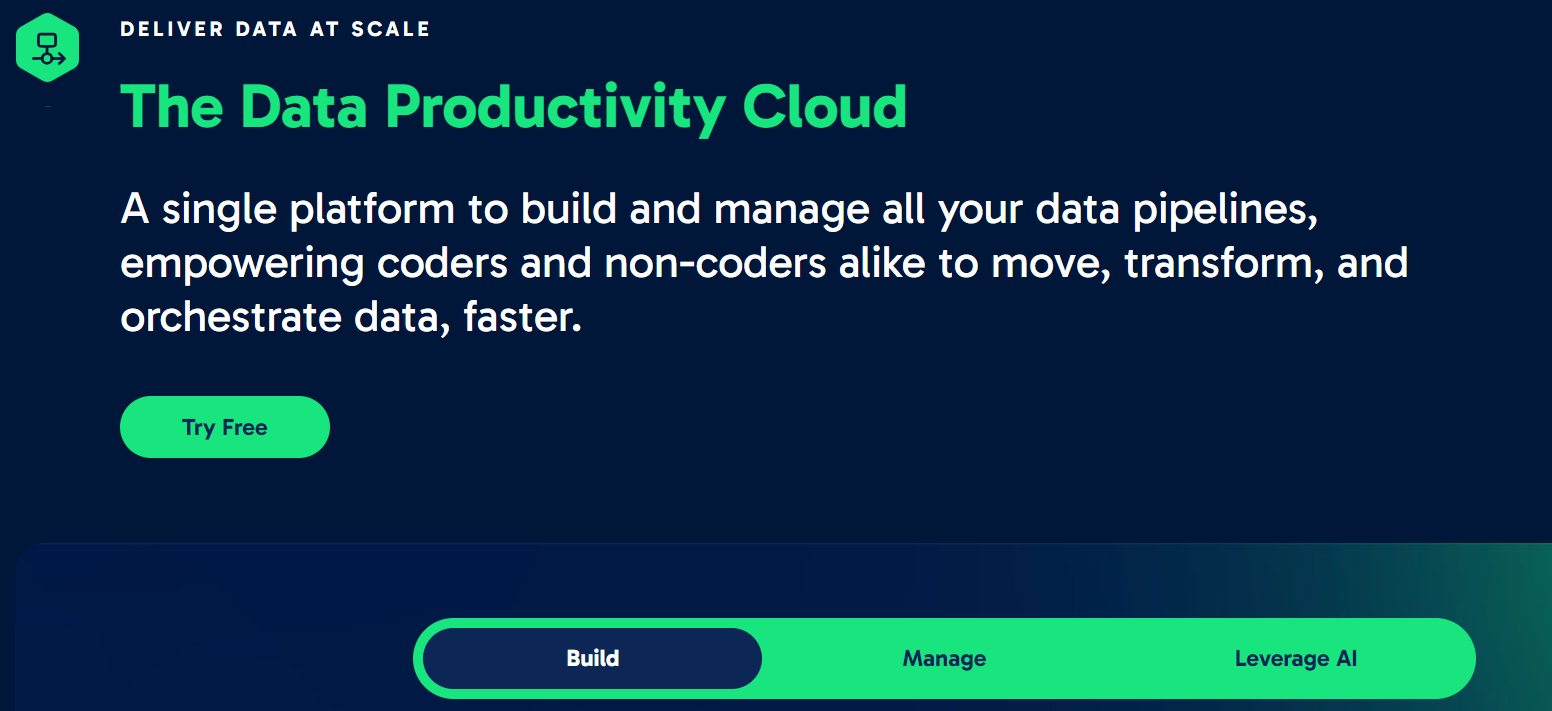
Created in 2011, Matillion is a cloud-based ETL solution that allows you to seamlessly extract, transform, and load data to your desired data warehouse or any destination. You can also integrate your data from different sources using its library of 150+ pre-built connectors, thus simplifying data connection between the source files and the target system.
Some of the unique features of Matillion include:
- Matillion possesses data transformation capabilities such as profiling, cleansing, and enrichment to ensure accurate data visualization.
- With Matillion, you can leverage data security features such as multi-factor authentication, role-based access control, and audit logs to ensure data integrity and confidentiality. In addition, it also provides you with Single Sign-on functionality to log in smoothly without compromising security.
Pricing
Matillion provides a flexible pay-as-you-go pricing model to scale your enterprise needs. It offers three versions to fulfill your integration needs—Basic, Advanced, and Enterprise. The Basic plan hosts limited users and is suitable for transforming and orchestrating pipelines using built-in connectors. The Advanced version has all the Basic plan features and is accessible to unlimited users. The Enterprise version includes all the Basic and Advanced plan features along with additional capabilities such as CDC pipelines and hybrid cloud deployment.
Hevo Data
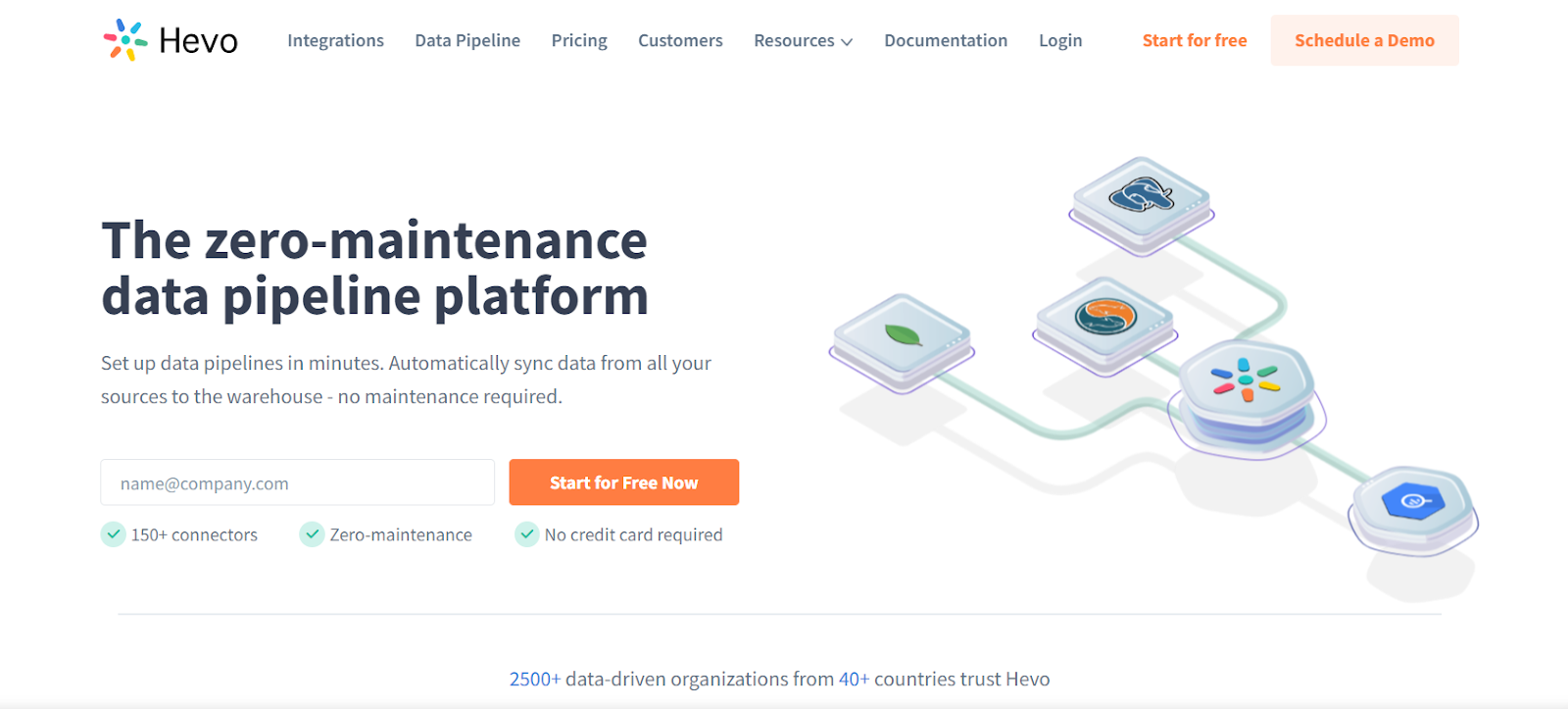
Created in 2017, Hevo Data is a powerful cloud-native data integration and replication platform. It allows you to extract data from more than 150 data sources, including databases and SaaS applications, and load it to 15+ destinations using its library of pre-built connectors. This helps you to automate your integration process and leverage this unified data to perform analytics and visualization.
Some of the unique features of Hevo Data are:
- Hevo employs the CDC feature so that you can easily track and capture data changes from your source files and replicate them to your destinations.
- You can quickly set up a data pipeline within minutes in a four-step process using Hevo. These include configuring the source, selecting data tables, setting up the destination, and finalizing the settings.
- With Hevo, you can safeguard your data as it adheres to the best security practices such as SOC 2, GDPR, and HIPAA to maintain data confidentiality.
Pricing
The pricing plan Hevo offers is transparent and comes in three versions—Free, Starter, and Professional. The Free version is accessible to everyone and is tailored to handle small data volumes. You can utilize its Starter plan to move a limited amount of data from databases using its 150 connectors library. However, if you are dealing with excessive data, you should use the Standard plan as it offers better data control and management.
Final Word
While integrate.io is sufficient to manage integration needs, it is always better to have knowledge of other platforms with better features. This article has given you a quick glance at the different data integration platforms you can utilize to expedite your data integration and management processes.
However, if you want a one-stop solution with advanced features to fulfill your data integration and replication needs, then Airbyte is the perfect choice for you. Sign up on the Airbyte platform today to uncover its amazing features and functionalities for efficient data analytics.
Suggested Read:
What should you do next?
Hope you enjoyed the reading. Here are the 3 ways we can help you in your data journey:



